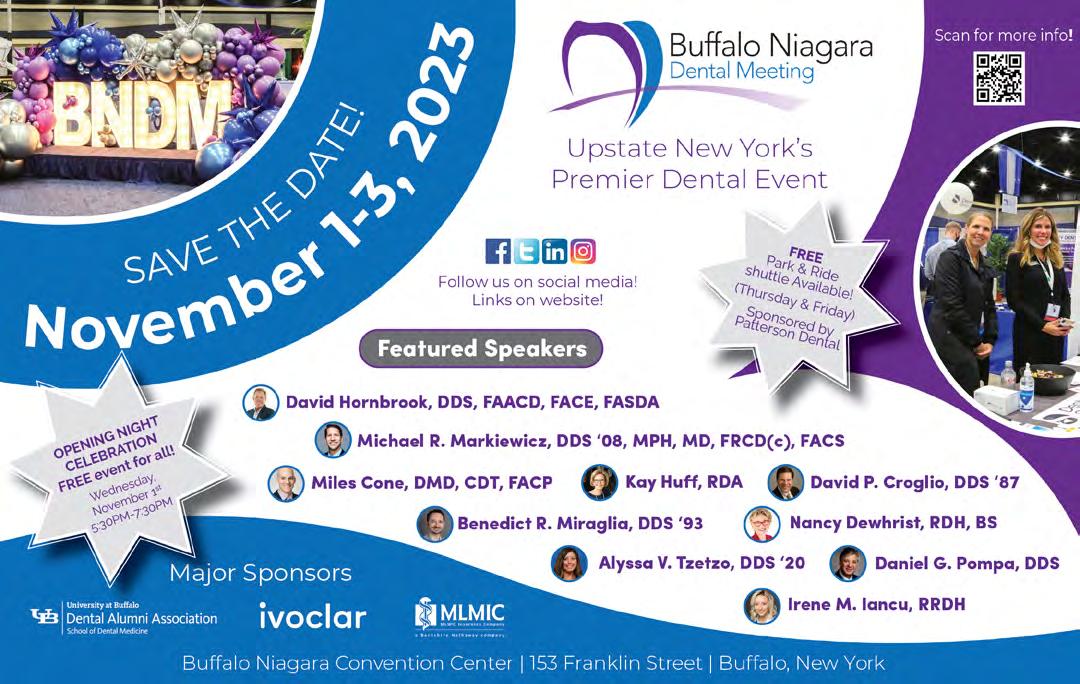
1 minute read
Editorial
Picking up the Pieces of the Dentist Mental Health Puzzle
Dentistry: a dream career only for those willing to accept its professional challenges and able to manage the inherent stress.
“DENTIST ranked top job.” Similar headlines extolling the virtues of a career in dentistry appear periodically on the internet and in newswires. They imply that dentistry’s high median salary, low unemployment and professional autonomy make it a dream profession. Yet, recent studies report dentists suffer from dramatically increasing diagnoses of anxiety disorders and rates of depression, significantly greater than the general population.[1] We can, in part, attribute this enigma to a general misconception of the demands upon dental practitioners, our profession’s failure to prepare dentists for the psychological and stress-related challenges of private practice, and dentists’ unwillingness to timely seek mental health counseling.
Dental educators and organized dentistry must assist predental candidates to determine whether they are cut out for dental practice, teach predoctoral dental students to better recognize and cope with stress and, together, work to eliminate the existing stigma associated with participating in mental health assistance programs.
Fitness for Dental Practice
Dental practice demands the dedication of a calling beyond that of a mere job, and society offers many other better opportunities to make more money faster. No doubt, dentists who embrace their professional responsibilities enjoy great personal satisfaction and comfortable financial remuneration. For them, dentistry is a dream profession. However, dentists who use dentistry to pursue wealth as an end in itself and attempt to avoid the unavoidable commitments required of our vocation will face greater work-related stress, financial dissatisfaction and risk of mental health challenges.
Applicants to dental school should understand that practicing dentists espouse to a purpose above wage earning before the prospective dental students make their career choice. Dentists promise to place the best interests of their patients above our self-interests and the best interests of society above those of our profession to meet our ethical and professional responsibilities. We must practice to the standard of care and comply with regulatory mandates to meet our legal duties. These duties require us to dedicate ourselves to helping others above personal gain and often contribute more than we receive. Practitioners who attempt to circumvent these principles in the search for higher income suffer the constant threat of disciplinary, ethical, and legal complaints and investigations and earn the negative reputation of using patients to serve their own interests.
Once dental school applicants understand and accept their professional role, they must recognize the inherently stressful, physical and psychological circumstances under which they will perform. Dentists routinely provide technique-sensitive procedures, with a microscopic margin for error, that can induce pain in a sensitive, inaccessible area of the body of a fearful, worried patient. To accomplish these daunting tasks, the practitioner must think critically, exercise good clinical judgment, humbly recognize and correct their own errors and earn the trust of the human beings we treat. Applicants who honestly self-assess their willingness and ability to undertake these unique responsibilities will better cope with the inevitable mental health challenges.
Dental service organizations claim to offer relief from some of the business stressors of practice ownership. However, no corporate dental practice owner, with their sales pitch to take care of the management side while the employee dentists just do dentistry, can fully eliminate all of the financial pressures on clinical performance or, more importantly, dentists’ inescapable ethical and legal commitments. Incoming dental students must intend to embrace, not evade, professional responsibility as a minimum threshold of fitness for practice.
The dental profession must rebut misportrayals of dentistry as an easy job guaranteed to make you rich. Our profession must better inform the media, public and, specifically, college students that dentistry is a dream profession, not due to the good pay for accepting minimal responsibility, but precisely because of the challenging professional commitments we must accept. The autonomy we enjoy, in return for successfully meeting these commitments, enables us to help our patients and form bonds with them that create the greatest satisfaction of the practice of dentistry. In the end, we accept whatever money comes from acting in the best interests of our patients.
The dental school interview and selection process should reinforce applicants’ understanding of the expectations they must meet. Although everyone should have the opportunity to serve as a dentist, a career in dentistry is not for everyone. Some applicants may prefer not to hear about or think they can avoid dentists’ professional responsibilities, but they are entitled to know all aspects of their potential role.
Stress Management Training for Dental Students
Uncontrolled psychological and physical stress threatens dentists’ general and mental health. Left unchecked, this distress can lead to negative behavioral changes, including, among others, anxiety disorders, depression and substance abuse. This downward spiral ultimately interferes with our ability, as practitioners, to deliver quality care to our patients. As a preventive measure, dental school curricula must incorporate stress management training early in the predoctoral program to help students identify the sources and signs of stress and better manage professional challenges.
Historically, the dental literature has featured extensive information on the sources and effects of stress in dental practice, but minimal and inadequate research on the methodologies and effectiveness of stress management programs for dental students.[2] Hence, no gold standard exists for the content of stress management training in the dental school curriculum, and most schools offer minimal formal instruction in this area.
Schools must teach basic principles of patient and practice management to better enable dentists to achieve excellence and coping mechanisms to deal with unavoidable stressors. Patient and practice management skills include time management, dealing with anxious patients and patients in pain, practice operational efficiency, and effective auxiliary utilization. Stress management techniques include behavior modification, such as relaxation mechanisms, activity scheduling, changing destructive ways of thinking, and better managing diet, exercise and interpersonal relationships.

Dentistry must take great care, however, to protect the high ethical, clinical and didactic standards currently demanded from our students and practitioners from erosion in the name of stress reduction. Stress, when appropriately directed, can serve as a positive force in a dentist’s professional development. Especially in the face of the increasing commercialization of dental practice, we cannot afford to reduce clinical and didactic requirements in schools and professional responsibilities in practice to make life easier for those individuals possibly not cut out for a career in dentistry in the first place.
Inevitably, even individuals fit for the practice of dentistry and armed with stress management training can succumb to professional pressures to the point that they need mental health assistance. However, too many in this position avoid seeking help. A 2019 poll from the American Psychiatric Association found mental health stigma caused over half of all employees to fear discussing mental health issues, and over one-third to fear retaliation, which allowed most mental health services to go unused.[3]
A 2016 study concluded that most societies and cultures maintain a negative attitude toward people with mental illness.[4] This stigma primarily stems from a lack of understanding and fear of mental illness as a disease due to inaccurate or misleading representations of individuals suffering from mental disorders. Researchers define three forms of stigma: public, self and institutional, all of which discriminate against this already marginalized group.
Public and institutional stigmas describe the general attitudes of the public that the mentally ill are dangerous and somehow responsible for their disease. Publicly, this leads employers, landlords and the healthcare system to discriminate by, respectively, not hiring or not renting to these individuals and, in some instances, offering them a lesser standard of healthcare. Institutionally, these prejudices find their way into laws and policies that can cause lost opportunities.
Self-stigma refers to the internalized shame individuals with a mental illness hold regarding their own condition because of the public stereotypes. In addition, dentists charged with taking care of others often view their mental illness as a professional failure and personal weakness. Ultimately, these stigmas threaten dentists’ employment, reputation and careers, deter those in need from seeking mental health assistance and allow their symptoms to worsen.
In 2021, the ADA House of Delegates passed Resolution 95H-2021, “Prioritizing the Mental Health of Dentists.” The resolution required the ADA to analyze the availability of resources to support dentists’ mental health and gather information regarding existing health and wellness programs across the tripartite, among other initiatives.[5] Currently, the ADA offers numerous programs available to its members, and the results of this formal analysis will expand their effectiveness. We must engage in expanded open dialogue regarding dentist mental health to raise understanding and empathy and, ultimately, reduce mental health stigmas.
Fit the Correct Pieces to Solve the Dentist Mental Health Puzzle
Dental education must ensure that applicants to our profession are willing to embrace professional responsibility and provide them with stress management training to deal with the challenges involved. Organized dentistry must continue to support practitioners’ overall well-being and fight to reduce the stigmas that cause dentists in need to avoid that support. Together, we can eliminate the nightmares from our dream profession.

REFERENCES
1. Burger D. Dentist Health and Well-Being Survey Report finds dentists struggle with anxiety, discomfort at work. ADA News, February 23, 2022. https://www.ada.org/publications/ada-news/2022/ february/dentist-health-and-well-being-survey-report-finds-dentists-struggle-with-anxiety.
2. Alzahem A, Van der Molen H, Alaujan A, DeBoer B. Stress management in dental students: a systematic review. Advances in Medical Education and Practice 2014:5,170.
3. American Psychiatric Association Public Opinion Poll. Released May 2019. APA Annual Meeting, San Francisco, CA.
4. Rossler W. Stigma of Mental Disorders. Published online 2016 Jul 28. doi:10.15252/ embr.201643041.
5. Burger D. Dentist Health and Well-Being Survey Report finds dentists struggle with anxiety, discomfort at work. ADA News, February 23, 2022. https://www.ada.org/publications/adanews/2022/february/dentist-health-and-well-being-survey-report-finds-dentists-strugglewith-anxiety.
Attention
THE NEW YORK STATE DENTAL JOURNAL is inviting applications from members of the New York State Dental Association interested in filling the position of Journal Associate Editor. The position is for one year, commencing January 2024. At the end of the year, the Associate Editor is expected to begin a two-year term as Editor, with the possibility of that term being extended by another three years.
The Associate Editor will be asked to assist the Editor in performing the following duties:
• Contribute relevant and cogent editorials.
• Solicit manuscripts from prospective authors/researchers.
• Find appropriate manuscript reviewers and manage the peer review process.
• Review manuscripts for clarity and accuracy and make final editorial decisions about manuscripts.
• Act as an ambassador for The Journal, with a vision to advance its standing and increase its impact. Candidates for this position must possess and demonstrate the following skills:
• Strong writer.
• Organized; able to meet deadlines.
• Open to new concepts and methodologies.
• Understand or be willing to learn digital publishing and platforms, such as Digital Commons and Google Scholar.
Interested candidates are asked to email a letter of introduction, CV and writing samples to the Managing Editor by August 18. Address submissions to Ms. Mary Stoll mstoll@nysdental.org.










